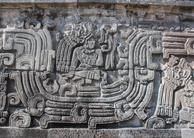A CouchSurfing Ethnography: Traveling and Connection in a Commodified World
By
2012, Vol. 4 No. 07 | pg. 3/3 | « Conclusion and DiscussionUltimately, CouchSurfing is more than just a system of free hostels around the world. While budget travelers can and do value the free accommodation provided by their hosts, this research demonstrates that CouchSurfers seek more than temporary hostels. Instead, CouchSurfers are motivated by a desire to make local connections, experience different cultures, and learn from the people and ideas they encounter through traveling. Rather than using money as exchange value in their interactions, CouchSurfers use shared dialogue, mutual relationship, and the experience of meaningful engagement as the primary indicators of value within CouchSurfing. At the end of our interview, Petya told me: “CouchSurfing…It is a program…for traveling, for getting to know new people. Just for living. It’s not a goal, you know? The goal is to be better. In mind, to get better. To know yourself better, that is the aim, I think so…because that is what we need to achieve in life.” Coming from the heart, these words resonate of the meaning created through this community. For Petya and many others, actions of sharing couches and traveling are not just the ends of an experience, but the means to relationship. For these people, Couchsurfing offers a valuable means to pursue cultural exchange, personal and emotional growth, and increased connections with fellow human beings. Moreover, Couchsurfing provides a space for people to engage in relationship-building in spheres distinct from the commodified spaces of commercial tourism. These relationships are shaped by the expectations and values of individuals, who create and are created by cultural realities. The social phenomenon of CouchSurfing raises important questions about tourism and traveling in the 21st century. Further research is needed to situate CouchSurfing within the spheres of globalization and modernism. Specifically, investigations should evaluate the viability of CouchSurfing as a mode of “alternative tourism” in the current era. Additional studies could compare and contrast CouchSurfing with other nonconventional paths of travel, such as through organic farms stays like WWOOF (World Wide Opportunities on Organic Farms), which functions as an exchange of labor for food and accommodation on an organic farm. Finally, studies should also investigate whether people from different countries and cultures are more likely to participate in CouchSurfing, and explore the socio-cultural reasons for why this is the case.ReferencesCouchSurfing Project Web 2.0. (2011). Our Mission. Available at: http://www.couchsurfing.org/ourmission.html (retrieved December 2011). CouchSurfing. (2010). About: CS Basics. Available at: http://www.couchsurfing.org/about.html/faq (retrieved December 2011). Hersberger JA, Murray AL and Rioux KS. (2007). Examining information exchange and virtual communities: An emergent framework. Online Information Review 31(2): 135–147. Hammersly, M. & Atkinson, P. (2007). Ethnography: Principles in Practice 3rd Edition. London and New York: Routledge. Lauterbach, D. & Truong, H., & Shah, T. & Adamic, L. (2009). Surfing a Web of Trust: Reputation and Reciprocity on CouchSurfing.com. Computational Science and Engineering, IEEE International Conference 4, 346-353. Peterson, K. & Siek, K. (2009). Analysis of Information Disclosure on a Social Networking Site. Lecture Notes in Computer Science 5621: 256-264. Rosen, D., & Lafontaine, P., & Hendrickson, B. (2011). CouchSurfing: Belonging and trust in a globally cooperative online social network. New Media & Society, 13(3), 1-18. Sunstein, C. (1996). Social Norms and Social Roles. Columbia Law Review, 96(4), 903-968. Tan, Jun-E. (2010). The Leap of Faith from Online to Offline:An Exploratory Study of Couchsurfing.org.”In: Aquisty, A., Smith, S., Sadegi, A.-R. (ed.). Berlin: Springer; pp. 367-380. Wolcott, H. (1999). Ethnography as a Way of Seeing. AltaMira Press. Inteviews SH 02.12.11. Interview with Saila Heittonen on December 2, 2011. MR 29.11.11. Interview with Maija Rantaharju on November 29, 2011. JR 29.11.11. Interview with Jarno Rantaharju on November 29, 2011. FH 19.10.11. Interview with Florian Hensberg on October 19, 2011. PB 29.10.11. Interview with Petya Bednarek on October 29, 2011. 1.) Names have been altered to ensure the anonymity of interview subjects. Suggested Reading from Inquiries Journal
Inquiries Journal provides undergraduate and graduate students around the world a platform for the wide dissemination of academic work over a range of core disciplines. Representing the work of students from hundreds of institutions around the globe, Inquiries Journal's large database of academic articles is completely free. Learn more | Blog | Submit Latest in Anthropology |


















